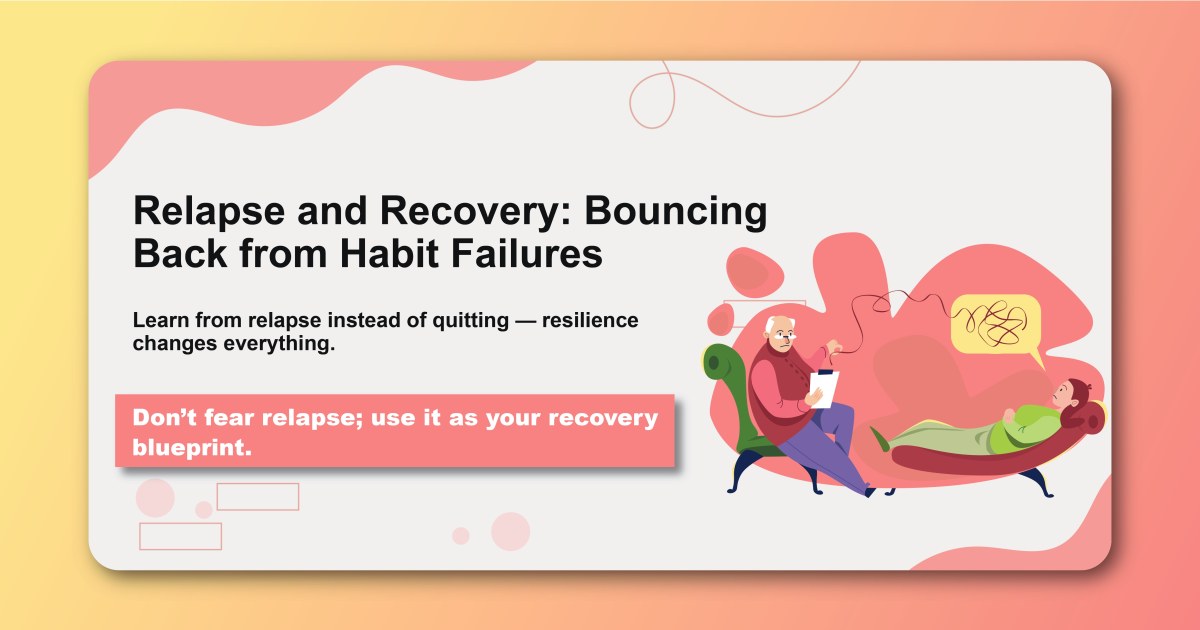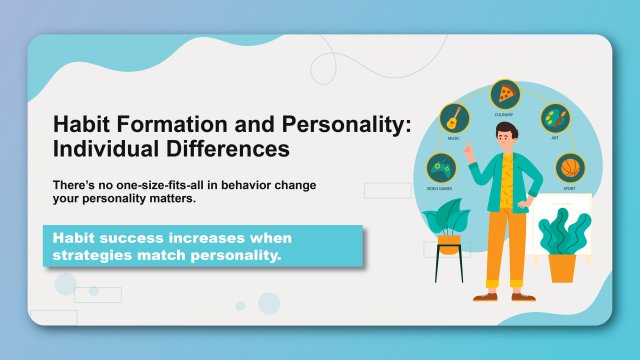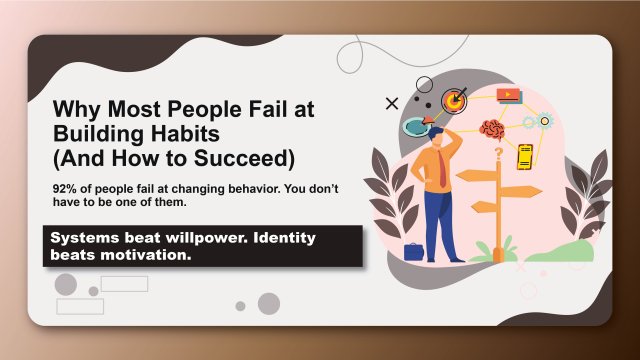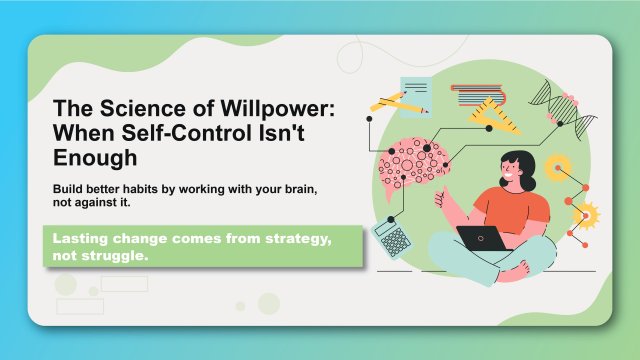One of the most challenging aspects of breaking bad habits is dealing with setbacks and relapses. Despite our best intentions and efforts, almost everyone experiences moments where they fall back into old patterns. These moments can feel devastating, leading to shame, self-criticism, and the temptation to give up entirely. However, understanding that relapse is a normal part of the change process and developing skills for bouncing back can be the difference between temporary setbacks and permanent failure.
Relapse doesn't mean you've failed or that you lack willpower. It's a common and often predictable part of behavior change that provides valuable information about your triggers, vulnerabilities, and the adjustments needed in your approach. The key is learning how to respond to relapses in ways that support your long-term goals rather than derailing your progress entirely.
Research shows that people who successfully break bad habits long-term typically experience multiple relapses before achieving stable change. What distinguishes successful individuals isn't the absence of setbacks, but rather their ability to learn from these experiences and quickly get back on track. They develop resilience, self-compassion, and practical strategies for managing relapses when they occur.
The concept of "bouncing back" from habit failures involves both immediate recovery strategies and long-term approaches that reduce the likelihood and impact of future relapses. This includes developing emotional regulation skills, building support systems, identifying and managing triggers, and creating flexible approaches that accommodate the inevitable challenges of behavior change.
This comprehensive guide explores the nature of relapse in habit change, provides practical strategies for recovery, and helps you develop the resilience needed for long-term success. Whether you're dealing with a recent setback or want to prepare for future challenges, these insights will help you maintain progress toward your goals.
Understanding Relapse in Habit Change
The Nature of Relapse
Relapse as Process, Not Event Relapse typically doesn't happen suddenly. It's usually a gradual process that begins with emotional and mental changes before culminating in behavioral relapse.
Relapse Stages:
- Emotional Relapse: Increased stress, neglect of self-care, isolation
- Mental Relapse: Thoughts about the old habit, planning or fantasizing
- Physical Relapse: Return to the unwanted behavior
Common Patterns Most people experience relapse in predictable patterns related to specific triggers, emotional states, or life circumstances.
Learning Opportunities Each relapse provides valuable information about personal triggers, vulnerabilities, and areas where additional support or strategies are needed.
Why Relapses Occur
Stress and Emotional Triggers High stress, negative emotions, and life challenges can overwhelm coping resources and trigger a return to familiar patterns.
Overconfidence and Complacency Success in breaking habits can lead to overconfidence and reduced vigilance, making relapse more likely.
Environmental Triggers Exposure to old environments, people, or situations associated with the habit can trigger automatic responses.
Lack of Alternative Coping Strategies Without adequate healthy coping mechanisms, people may return to old habits during difficult times.
Perfectionist Thinking All-or-nothing thinking can turn small slip-ups into major relapses.
The Relapse Cycle
Trigger Event A specific situation, emotion, or stressor that activates the desire to return to the old habit.
Internal Conflict The struggle between wanting to maintain positive change and the urge to engage in the old behavior.
Rationalization Mental justifications for why it's okay to engage in the behavior "just this once."
Behavioral Relapse Return to the unwanted behavior, often followed by immediate relief but subsequent guilt and regret.
Emotional Aftermath Feelings of shame, guilt, disappointment, and self-criticism that can perpetuate the cycle.
Immediate Recovery Strategies
Damage Control
Stop the Behavior Quickly As soon as you recognize a relapse is occurring, take immediate action to stop the behavior rather than continuing.
Assess the Situation Quickly evaluate what triggered the relapse and what immediate steps can prevent it from continuing.
Implement Emergency Strategies Use pre-planned emergency strategies to interrupt the relapse pattern.
Seek Immediate Support Reach out to support people who can help you get back on track quickly.
Emotional Regulation
Manage Self-Criticism Recognize that self-criticism and shame only make recovery more difficult. Practice self-compassion instead.
Process Emotions Allow yourself to feel disappointed without being overwhelmed by negative emotions.
Reframe the Experience View the relapse as a learning opportunity rather than a failure.
Use Coping Strategies Implement healthy coping strategies to manage the emotional aftermath of relapse.
Quick Recovery Actions
Return to Routine Get back to your normal routines and positive habits as quickly as possible.
Review Your Plan Examine your behavior change plan and identify needed modifications.
Recommit to Goals Reaffirm your commitment to your goals and the reasons for wanting to change.
Take Positive Action Engage in positive behaviors that reinforce your identity and goals.
Long-Term Recovery Strategies
Building Resilience
Develop Emotional Regulation Skills Build capacity to handle difficult emotions without resorting to old habits.
Stress Management Create comprehensive stress management strategies that don't depend on the old habit.
Social Support Build a strong network of supportive relationships that can help during challenging times.
Flexibility and Adaptation Develop flexible approaches that can adapt to changing circumstances and challenges.
Relapse Prevention Planning
Identify Personal Triggers Develop awareness of your specific triggers and high-risk situations.
Create Response Plans Develop specific plans for handling identified triggers and high-risk situations.
Emergency Strategies Create a toolkit of emergency strategies for moments when you feel close to relapse.
Support System Activation Plan how to quickly activate your support system when you're struggling.
Learning from Setbacks
Relapse Analysis Systematically analyze each relapse to understand what happened and why.
Pattern Recognition Identify patterns in your relapses to predict and prevent future occurrences.
Strategy Refinement Use insights from relapses to refine and improve your behavior change strategies.
Skill Development Develop new skills based on what you learned from relapse experiences.
Psychological Approaches to Recovery
Cognitive Strategies
Thought Challenging Challenge negative thoughts and catastrophic thinking that follow relapses.
Reframing Techniques Reframe relapses as temporary setbacks rather than permanent failures.
Perspective Taking Gain perspective on relapses by viewing them in the context of your overall progress.
Growth Mindset Adopt a growth mindset that views setbacks as opportunities for learning and improvement.
Behavioral Interventions
Behavior Chain Analysis Analyze the chain of events leading to relapse to identify intervention points.
Contingency Planning Develop if-then plans for handling specific relapse scenarios.
Behavioral Activation Engage in positive activities that improve mood and reinforce your identity.
Habit Rebuilding Systematically rebuild positive habits that may have been disrupted by the relapse.
Emotional Processing
Acceptance and Mindfulness Practice accepting difficult emotions without trying to escape them through old habits.
Emotional Expression Find healthy ways to express and process the emotions that contributed to relapse.
Self-Compassion Treat yourself with the same kindness you would show a good friend facing similar challenges.
Forgiveness Practice self-forgiveness to release shame and guilt that can perpetuate relapse cycles.
Building Support Systems
Professional Support
Therapists and Counselors Work with mental health professionals who specialize in behavior change and addiction.
Support Groups Join support groups with others who understand the challenges of breaking bad habits.
Coaches and Mentors Work with coaches or mentors who can provide guidance and accountability.
Medical Support Consult with medical professionals when physical health issues contribute to relapse.
Personal Support Networks
Family and Friends Educate supportive family members and friends about how they can help during relapses.
Accountability Partners Develop relationships with people who can provide honest feedback and accountability.
Peer Support Connect with others who are working on similar behavior change goals.
Online Communities Participate in online communities that provide support and understanding.
Creating Safety Nets
Emergency Contacts Identify people you can call immediately when you're struggling with the urge to relapse.
Crisis Plans Develop specific plans for handling crisis situations that might trigger relapse.
Environmental Supports Create environmental supports that make recovery easier and relapse less likely.
Resource Lists Maintain lists of resources, tools, and strategies that can help during difficult times.
Preventing Future Relapses
Lifestyle Factors
Sleep and Rest Maintain adequate sleep and rest to support emotional regulation and decision-making.
Exercise and Physical Health Regular exercise and good physical health support mental resilience and stress management.
Nutrition and Self-Care Proper nutrition and self-care practices support overall well-being and relapse prevention.
Stress Management Develop comprehensive stress management strategies that don't involve the old habit.
Environmental Management
Trigger Avoidance When possible, avoid or modify environments that trigger the urge to relapse.
Support Enhancement Enhance environmental supports for positive behaviors and recovery.
Social Environment Maintain social environments that support your goals and discourage relapse.
Physical Environment Create physical environments that support recovery and positive behaviors.
Ongoing Vigilance
Regular Check-ins Regularly assess your emotional state, stress levels, and risk factors for relapse.
Plan Updates Regularly update your relapse prevention plans based on new insights and changing circumstances.
Skill Practice Continuously practice and refine the skills needed for long-term success.
Support Maintenance Maintain and strengthen your support systems even during periods of success.
Maintaining Long-Term Progress
Progress Perspective
Focus on Overall Trends Evaluate your progress based on overall trends rather than individual setbacks.
Celebrate Improvements Acknowledge and celebrate improvements, even if they're not perfect.
Realistic Expectations Maintain realistic expectations about the behavior change process.
Patience with Process Accept that lasting change takes time and involves setbacks.
Continuous Growth
Skill Development Continuously develop new skills and strategies for maintaining positive change.
Identity Evolution Allow your identity to evolve as you make progress in breaking bad habits.
Goal Refinement Refine and adjust your goals based on experience and changing circumstances.
Life Integration Integrate positive behaviors into your life in ways that feel natural and sustainable.
Helping Others
Share Your Experience Share your experiences with others who are struggling with similar challenges.
Mentor Others Consider mentoring others who are earlier in their behavior change journey.
Contribute to Community Contribute to communities and resources that support behavior change.
Advocacy Advocate for better understanding and support of people working to break bad habits.
Relapse and recovery are normal parts of the behavior change process. What matters most is not avoiding relapses entirely, but developing the skills and resilience to bounce back quickly when they occur. By understanding the nature of relapse, implementing effective recovery strategies, and building strong support systems, you can maintain long-term progress toward your goals.
Remember that every person who has successfully broken a bad habit has faced setbacks along the way. What distinguishes successful individuals is their ability to learn from these experiences, develop resilience, and maintain commitment to their long-term goals despite temporary failures.
The journey of breaking bad habits is not linear, and expecting perfection only sets you up for disappointment. Instead, focus on building the skills, support systems, and mindset needed to handle whatever challenges arise in your behavior change journey.
Struggling with setbacks in your habit change journey? Find support and recovery strategies with Habityzer and discover how to bounce back from relapses while maintaining long-term progress toward your goals.



